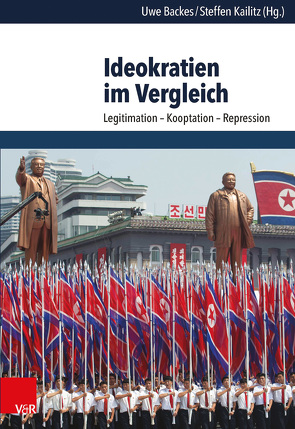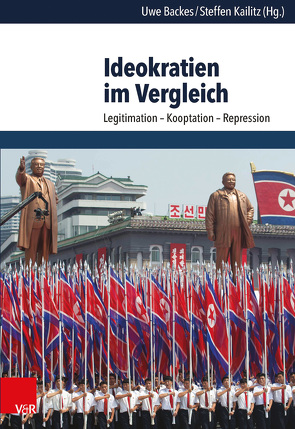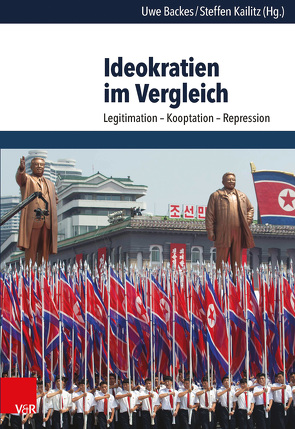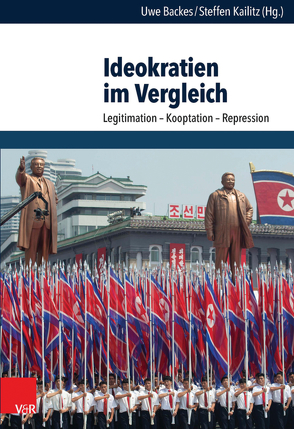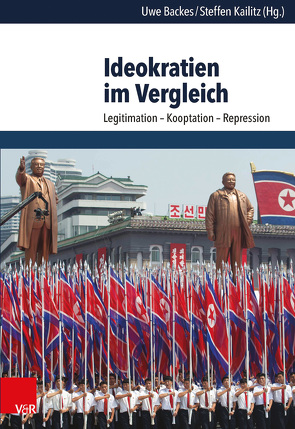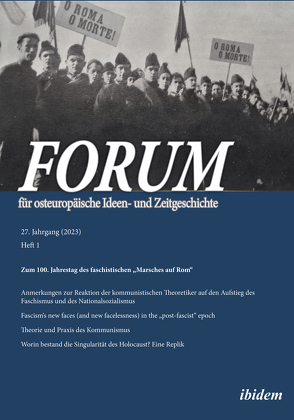
[Over] the last decade there has emerged a growing explicit (theoretically formulated) or tacit (pragmatic) acceptance by Anglophone academics working in the field that fascism’s ineliminable core is made up of the vision of a regenerated political culture and national community brought about in a post-liberal age. Inevitably, such a consensus can never be total and there are academics working in fascist studies who continue to apply a different ideal type of fascism, some of whom express deep scepticism about the very existence of an area of convergence on the centrality to fascism of an ultra-nationalist myth of rebirth. The most cited version of the consensus applied by academics who are sympathetic to it is the highly synthetic formula that I used to encapsulate my own ideal type: ‘Fascism is a political ideology whose mythic core in its various permutations is a palingenetic form of populist ultra-nationalism …
The totalitarian movements represented by the PNF and the NSDAP and the totalitarian regimes that they underpinned became the role model for all revolutionary nationalists in the inter-war period and synonymous with totalitarian, mass-based revolutionary nationalism itself. This became known as ‘fascism’ after the first such movement to achieve power, namely Mussolini’s fascismo. However, it was only in Italy and Germany that the structural crisis of liberal society was profound enough to generate a genuinely charismatic form of populist politics, one which was not confined to the hard core of movement activists, but involved the particular type of consensus generated by a ‘palingenetic political community’, thereby creating the basis for a fascist regime.
(Aus dem Beitrag von Roger Griffin)
Aktualisiert: 2023-07-03
> findR *
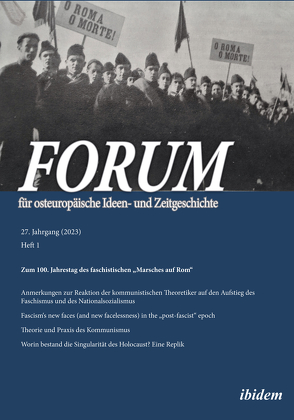
[Over] the last decade there has emerged a growing explicit (theoretically formulated) or tacit (pragmatic) acceptance by Anglophone academics working in the field that fascism’s ineliminable core is made up of the vision of a regenerated political culture and national community brought about in a post-liberal age. Inevitably, such a consensus can never be total and there are academics working in fascist studies who continue to apply a different ideal type of fascism, some of whom express deep scepticism about the very existence of an area of convergence on the centrality to fascism of an ultra-nationalist myth of rebirth. The most cited version of the consensus applied by academics who are sympathetic to it is the highly synthetic formula that I used to encapsulate my own ideal type: ‘Fascism is a political ideology whose mythic core in its various permutations is a palingenetic form of populist ultra-nationalism …
The totalitarian movements represented by the PNF and the NSDAP and the totalitarian regimes that they underpinned became the role model for all revolutionary nationalists in the inter-war period and synonymous with totalitarian, mass-based revolutionary nationalism itself. This became known as ‘fascism’ after the first such movement to achieve power, namely Mussolini’s fascismo. However, it was only in Italy and Germany that the structural crisis of liberal society was profound enough to generate a genuinely charismatic form of populist politics, one which was not confined to the hard core of movement activists, but involved the particular type of consensus generated by a ‘palingenetic political community’, thereby creating the basis for a fascist regime.
(Aus dem Beitrag von Roger Griffin)
Aktualisiert: 2023-07-03
> findR *
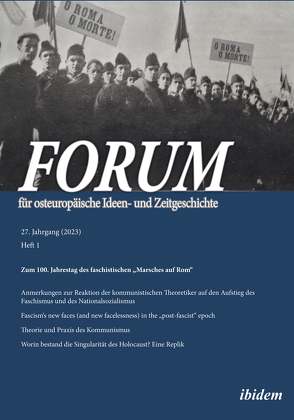
[Over] the last decade there has emerged a growing explicit (theoretically formulated) or tacit (pragmatic) acceptance by Anglophone academics working in the field that fascism’s ineliminable core is made up of the vision of a regenerated political culture and national community brought about in a post-liberal age. Inevitably, such a consensus can never be total and there are academics working in fascist studies who continue to apply a different ideal type of fascism, some of whom express deep scepticism about the very existence of an area of convergence on the centrality to fascism of an ultra-nationalist myth of rebirth. The most cited version of the consensus applied by academics who are sympathetic to it is the highly synthetic formula that I used to encapsulate my own ideal type: ‘Fascism is a political ideology whose mythic core in its various permutations is a palingenetic form of populist ultra-nationalism …
The totalitarian movements represented by the PNF and the NSDAP and the totalitarian regimes that they underpinned became the role model for all revolutionary nationalists in the inter-war period and synonymous with totalitarian, mass-based revolutionary nationalism itself. This became known as ‘fascism’ after the first such movement to achieve power, namely Mussolini’s fascismo. However, it was only in Italy and Germany that the structural crisis of liberal society was profound enough to generate a genuinely charismatic form of populist politics, one which was not confined to the hard core of movement activists, but involved the particular type of consensus generated by a ‘palingenetic political community’, thereby creating the basis for a fascist regime.
(Aus dem Beitrag von Roger Griffin)
Aktualisiert: 2023-06-29
> findR *
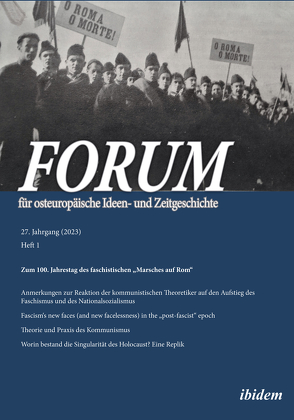
[Over] the last decade there has emerged a growing explicit (theoretically formulated) or tacit (pragmatic) acceptance by Anglophone academics working in the field that fascism’s ineliminable core is made up of the vision of a regenerated political culture and national community brought about in a post-liberal age. Inevitably, such a consensus can never be total and there are academics working in fascist studies who continue to apply a different ideal type of fascism, some of whom express deep scepticism about the very existence of an area of convergence on the centrality to fascism of an ultra-nationalist myth of rebirth. The most cited version of the consensus applied by academics who are sympathetic to it is the highly synthetic formula that I used to encapsulate my own ideal type: ‘Fascism is a political ideology whose mythic core in its various permutations is a palingenetic form of populist ultra-nationalism …
The totalitarian movements represented by the PNF and the NSDAP and the totalitarian regimes that they underpinned became the role model for all revolutionary nationalists in the inter-war period and synonymous with totalitarian, mass-based revolutionary nationalism itself. This became known as ‘fascism’ after the first such movement to achieve power, namely Mussolini’s fascismo. However, it was only in Italy and Germany that the structural crisis of liberal society was profound enough to generate a genuinely charismatic form of populist politics, one which was not confined to the hard core of movement activists, but involved the particular type of consensus generated by a ‘palingenetic political community’, thereby creating the basis for a fascist regime.
(Aus dem Beitrag von Roger Griffin)
Aktualisiert: 2023-06-29
> findR *
Die Autoren des Bandes beleuchten die spezifische Funktionsweise von Ideokratien.
Aktualisiert: 2023-06-28
Autor:
Uwe Backes,
Peter Bernholz,
Wolfgang Bialas,
Lothar Fritze,
Johannes Gerschewski,
Christian Göbel,
Udo Grashoff,
Roger Griffin,
Steffen Kailitz,
Hermann Lübbe,
Leonid Luks,
Jerzy Macków,
Lorenzo Santoro,
Manfred G. Schmidt,
Peter Thiery,
Jiwon Yoon
Die Autoren des Bandes beleuchten die spezifische Funktionsweise von Ideokratien.
Aktualisiert: 2023-06-28
Autor:
Uwe Backes,
Peter Bernholz,
Wolfgang Bialas,
Lothar Fritze,
Johannes Gerschewski,
Christian Göbel,
Udo Grashoff,
Roger Griffin,
Steffen Kailitz,
Hermann Lübbe,
Leonid Luks,
Jerzy Macków,
Lorenzo Santoro,
Manfred G. Schmidt,
Peter Thiery,
Jiwon Yoon
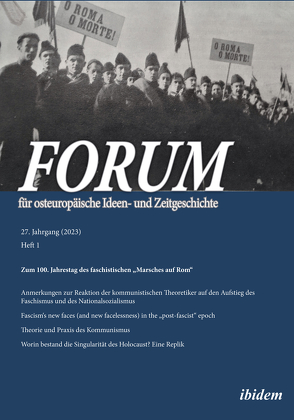
[Over] the last decade there has emerged a growing explicit (theoretically formulated) or tacit (pragmatic) acceptance by Anglophone academics working in the field that fascism’s ineliminable core is made up of the vision of a regenerated political culture and national community brought about in a post-liberal age. Inevitably, such a consensus can never be total and there are academics working in fascist studies who continue to apply a different ideal type of fascism, some of whom express deep scepticism about the very existence of an area of convergence on the centrality to fascism of an ultra-nationalist myth of rebirth. The most cited version of the consensus applied by academics who are sympathetic to it is the highly synthetic formula that I used to encapsulate my own ideal type: ‘Fascism is a political ideology whose mythic core in its various permutations is a palingenetic form of populist ultra-nationalism …
The totalitarian movements represented by the PNF and the NSDAP and the totalitarian regimes that they underpinned became the role model for all revolutionary nationalists in the inter-war period and synonymous with totalitarian, mass-based revolutionary nationalism itself. This became known as ‘fascism’ after the first such movement to achieve power, namely Mussolini’s fascismo. However, it was only in Italy and Germany that the structural crisis of liberal society was profound enough to generate a genuinely charismatic form of populist politics, one which was not confined to the hard core of movement activists, but involved the particular type of consensus generated by a ‘palingenetic political community’, thereby creating the basis for a fascist regime.
(Aus dem Beitrag von Roger Griffin)
Aktualisiert: 2023-06-21
> findR *
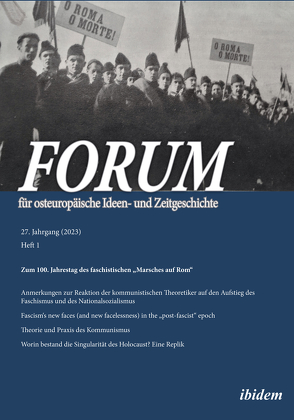
[Over] the last decade there has emerged a growing explicit (theoretically formulated) or tacit (pragmatic) acceptance by Anglophone academics working in the field that fascism’s ineliminable core is made up of the vision of a regenerated political culture and national community brought about in a post-liberal age. Inevitably, such a consensus can never be total and there are academics working in fascist studies who continue to apply a different ideal type of fascism, some of whom express deep scepticism about the very existence of an area of convergence on the centrality to fascism of an ultra-nationalist myth of rebirth. The most cited version of the consensus applied by academics who are sympathetic to it is the highly synthetic formula that I used to encapsulate my own ideal type: ‘Fascism is a political ideology whose mythic core in its various permutations is a palingenetic form of populist ultra-nationalism …
The totalitarian movements represented by the PNF and the NSDAP and the totalitarian regimes that they underpinned became the role model for all revolutionary nationalists in the inter-war period and synonymous with totalitarian, mass-based revolutionary nationalism itself. This became known as ‘fascism’ after the first such movement to achieve power, namely Mussolini’s fascismo. However, it was only in Italy and Germany that the structural crisis of liberal society was profound enough to generate a genuinely charismatic form of populist politics, one which was not confined to the hard core of movement activists, but involved the particular type of consensus generated by a ‘palingenetic political community’, thereby creating the basis for a fascist regime.
(Aus dem Beitrag von Roger Griffin)
Aktualisiert: 2023-06-21
> findR *
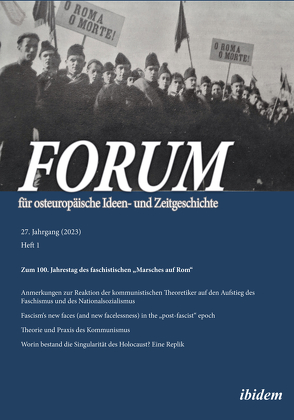
[Over] the last decade there has emerged a growing explicit (theoretically formulated) or tacit (pragmatic) acceptance by Anglophone academics working in the field that fascism’s ineliminable core is made up of the vision of a regenerated political culture and national community brought about in a post-liberal age. Inevitably, such a consensus can never be total and there are academics working in fascist studies who continue to apply a different ideal type of fascism, some of whom express deep scepticism about the very existence of an area of convergence on the centrality to fascism of an ultra-nationalist myth of rebirth. The most cited version of the consensus applied by academics who are sympathetic to it is the highly synthetic formula that I used to encapsulate my own ideal type: ‘Fascism is a political ideology whose mythic core in its various permutations is a palingenetic form of populist ultra-nationalism …
The totalitarian movements represented by the PNF and the NSDAP and the totalitarian regimes that they underpinned became the role model for all revolutionary nationalists in the inter-war period and synonymous with totalitarian, mass-based revolutionary nationalism itself. This became known as ‘fascism’ after the first such movement to achieve power, namely Mussolini’s fascismo. However, it was only in Italy and Germany that the structural crisis of liberal society was profound enough to generate a genuinely charismatic form of populist politics, one which was not confined to the hard core of movement activists, but involved the particular type of consensus generated by a ‘palingenetic political community’, thereby creating the basis for a fascist regime.
(Aus dem Beitrag von Roger Griffin)
Aktualisiert: 2023-06-21
> findR *
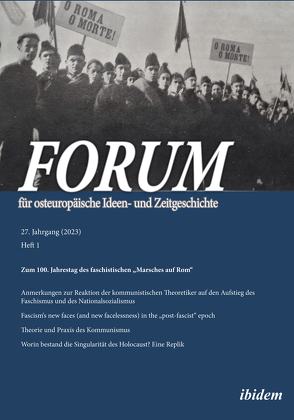
[Over] the last decade there has emerged a growing explicit (theoretically formulated) or tacit (pragmatic) acceptance by Anglophone academics working in the field that fascism’s ineliminable core is made up of the vision of a regenerated political culture and national community brought about in a post-liberal age. Inevitably, such a consensus can never be total and there are academics working in fascist studies who continue to apply a different ideal type of fascism, some of whom express deep scepticism about the very existence of an area of convergence on the centrality to fascism of an ultra-nationalist myth of rebirth. The most cited version of the consensus applied by academics who are sympathetic to it is the highly synthetic formula that I used to encapsulate my own ideal type: ‘Fascism is a political ideology whose mythic core in its various permutations is a palingenetic form of populist ultra-nationalism …
The totalitarian movements represented by the PNF and the NSDAP and the totalitarian regimes that they underpinned became the role model for all revolutionary nationalists in the inter-war period and synonymous with totalitarian, mass-based revolutionary nationalism itself. This became known as ‘fascism’ after the first such movement to achieve power, namely Mussolini’s fascismo. However, it was only in Italy and Germany that the structural crisis of liberal society was profound enough to generate a genuinely charismatic form of populist politics, one which was not confined to the hard core of movement activists, but involved the particular type of consensus generated by a ‘palingenetic political community’, thereby creating the basis for a fascist regime.
(Aus dem Beitrag von Roger Griffin)
Aktualisiert: 2023-06-21
> findR *
Die Autoren des Bandes beleuchten die spezifische Funktionsweise von Ideokratien.
Aktualisiert: 2023-05-28
Autor:
Uwe Backes,
Peter Bernholz,
Wolfgang Bialas,
Lothar Fritze,
Johannes Gerschewski,
Christian Göbel,
Udo Grashoff,
Roger Griffin,
Steffen Kailitz,
Hermann Lübbe,
Leonid Luks,
Jerzy Macków,
Lorenzo Santoro,
Manfred G. Schmidt,
Peter Thiery,
Jiwon Yoon
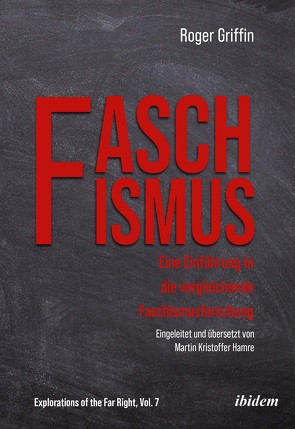
Der Begriff „Faschismus“ scheint zu einem Allerweltsbegriff geworden zu sein: Ausgehend von Mussolinis „Faschisten“, übernommen von den Nationalsozialisten unter Hitler, findet er sich heute in nahezu allen politischen Auseinandersetzungen: Trump, Putin, Orbán, Bolsonaro, in Deutschland Höcke, die AfD.
Während einige argumentierten, dem Wort „Faschismus“ fehle es an jeglicher charakteristischen, begrifflichen Bedeutung, liefern andere ausführliche Definitionen seiner –vermeintlich oder tatsächlich – wesentlichen Merkmale. Es handelt sich zweifelsohne um einen Begriff, dessen genaue Bestimmung eine einzigartige Herausforderung darstellt.
Roger Griffin, einer der führenden Experten auf dem Gebiet der Faschismusforschung, analysiert mit einzigartiger begrifflicher Klarheit und zugleich sehr lesbar die Ideologie des Faschismus. Er untersucht Ursprung und Entwicklung des Faschismus als politisches Konzept von seinen historischen Anfängen im Italien der 1920er-Jahre bis hin zur Gegenwart – und leitet uns durch das verworrene Labyrinth an Debatten über Natur, Bedeutung und Definitionen des Faschismus. Mit Kompetenz und Präzision beleuchtet Griffin die faschistische Dynamik als utopische Ideologie von nationaler und zugleich ‚rassischer‘ Wiedergeburt. Dabei untersucht er insbesondere auch die Wandelbarkeit des Faschismus über den Zweiten Weltkrieg hinaus und ermöglicht so ein Verständnis faschistischer Elemente in gegenwärtigen politischen Phänomenen wie der griechischen Goldenen Morgenröte, Marine Le Pens Rassemblement National oder der Partei Alternative für Deutschland.
Nicht nur für Studierende der politischen Theorie, der Ideengeschichte und der Neuesten Geschichte Deutschlands, Europas und der Welt ist dieser kompakte und fesselnde Band von großem Interesse, sondern auch für alle, die angesichts des vieldiskutierten Ansteigens faschistischer politischer Aktivitäten in Sorge sind.
Roger Griffins Einsichten in die Faschismusforschung werden dabei erstmalig in deutscher Sprache zugänglich gemacht.
In einem hochaktuellen Nachwort widmet sich Fabian Virchow, Professor für Politikwissenschaften und Experte für Rechtsextremismus und Neonazismus, der Frage, inwieweit sich der Faschismusbegriff auch auf die gegenwärtige Partei Alternative für Deutschland anwenden lässt.
Aktualisiert: 2021-07-08
> findR *
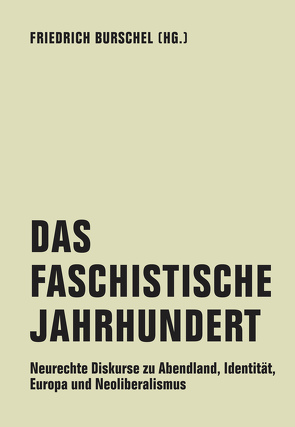
Mussolinis Vorhersage eines Jahrhunderts des Faschismus von 1920 reicht bis heute, da weltweit völkische, nationalistische und in vielfacher Hinsicht faschistische Bewegungen auf dem Vormarsch sind, autoritäre Regime an der Macht oder an Regierungen beteiligt sind. Rechtes Denken und faschistische Ideologie sind heute wieder salonfähig und nennen sich „neu“, auch wenn die Ideen dahinter steinalt sind und ihre Wurzeln tief ins 20. Jahrhundert hinunterreichen.
In ihren Beiträgen klopfen die Autor*innen dieses Bandes, Julian Bruns, Felix Korsch, Felix Schilk, Natascha Strobl und Volkmar Wölk, die aufgeladenen Begriffe „Abendland“, „Europa“, „Liberalismus“ und „Identität“ auf ihre Herkunft und Entwicklung und daraufhin ab, welche Bedeutung sie heute für eine Neue Rechte haben, die sich unter anderem auf die sogenannte Konservative Revolution und den Faschismus der 1920er Jahre beruft. Zu hören ist dabei der Widerhall von Krieg, Gewalt und Terrorismus. Das titelgebende Mussolini-Zitat ist Gegenstand des Beitrages des großen britischen Faschismusforschers Roger Griffin in diesem Buch.
Aktualisiert: 2021-09-29
> findR *
Aktualisiert: 2019-04-18
Autor:
Uwe Backes,
Peter Bernholz,
Wolfgang Bialas,
Lothar Fritze,
Johannes Gerschewski,
Christian Göbel,
Udo Grashoff,
Roger Griffin,
Steffen Kailitz,
Hermann Lübbe,
Leonid Luks,
Jerzy Macków,
Lorenzo Santoro,
Manfred G. Schmidt,
Peter Thiery,
Jiwon Yoon
Die Autoren des Bandes beleuchten die spezifische Funktionsweise von Ideokratien.
Aktualisiert: 2023-04-28
Autor:
Uwe Backes,
Peter Bernholz,
Wolfgang Bialas,
Lothar Fritze,
Johannes Gerschewski,
Christian Göbel,
Udo Grashoff,
Roger Griffin,
Steffen Kailitz,
Hermann Lübbe,
Leonid Luks,
Jerzy Macków,
Lorenzo Santoro,
Manfred G. Schmidt,
Peter Thiery,
Jiwon Yoon
MEHR ANZEIGEN
Bücher von Griffin, Roger
Sie suchen ein Buch oder Publikation vonGriffin, Roger ? Bei Buch findr finden Sie alle Bücher Griffin, Roger.
Entdecken Sie neue Bücher oder Klassiker für Sie selbst oder zum Verschenken. Buch findr hat zahlreiche Bücher
von Griffin, Roger im Sortiment. Nehmen Sie sich Zeit zum Stöbern und finden Sie das passende Buch oder die
Publiketion für Ihr Lesevergnügen oder Ihr Interessensgebiet. Stöbern Sie durch unser Angebot und finden Sie aus
unserer großen Auswahl das Buch, das Ihnen zusagt. Bei Buch findr finden Sie Romane, Ratgeber, wissenschaftliche und
populärwissenschaftliche Bücher uvm. Bestellen Sie Ihr Buch zu Ihrem Thema einfach online und lassen Sie es sich
bequem nach Hause schicken. Wir wünschen Ihnen schöne und entspannte Lesemomente mit Ihrem Buch
von Griffin, Roger .
Griffin, Roger - Große Auswahl an Publikationen bei Buch findr
Bei uns finden Sie Bücher aller beliebter Autoren, Neuerscheinungen, Bestseller genauso wie alte Schätze. Bücher
von Griffin, Roger die Ihre Fantasie anregen und Bücher, die Sie weiterbilden und Ihnen wissenschaftliche Fakten
vermitteln. Ganz nach Ihrem Geschmack ist das passende Buch für Sie dabei. Finden Sie eine große Auswahl Bücher
verschiedenster Genres, Verlage, Schlagworte Genre bei Buchfindr:
Unser Repertoire umfasst Bücher von
- Griffioen, Karel
- Griffioen, Pim
- Griffioen, Sander
- Griffis, Gigi
- Griffith, Ambrose
- Griffith, Cindy
- Griffith, Danielle
- Griffith, Ennea T
- Griffith, Ennea Tess
- Griffith, Graham C
Sie haben viele Möglichkeiten bei Buch findr die passenden Bücher für Ihr Lesevergnügen zu entdecken. Nutzen Sie
unsere Suchfunktionen, um zu stöbern und für Sie interessante Bücher in den unterschiedlichen Genres und Kategorien
zu finden. Neben Büchern von Griffin, Roger und Büchern aus verschiedenen Kategorien finden Sie schnell und
einfach auch eine Auflistung thematisch passender Publikationen. Probieren Sie es aus, legen Sie jetzt los! Ihrem
Lesevergnügen steht nichts im Wege. Nutzen Sie die Vorteile Ihre Bücher online zu kaufen und bekommen Sie die
bestellten Bücher schnell und bequem zugestellt. Nehmen Sie sich die Zeit, online die Bücher Ihrer Wahl anzulesen,
Buchempfehlungen und Rezensionen zu studieren, Informationen zu Autoren zu lesen. Viel Spaß beim Lesen wünscht Ihnen
das Team von Buchfindr.




